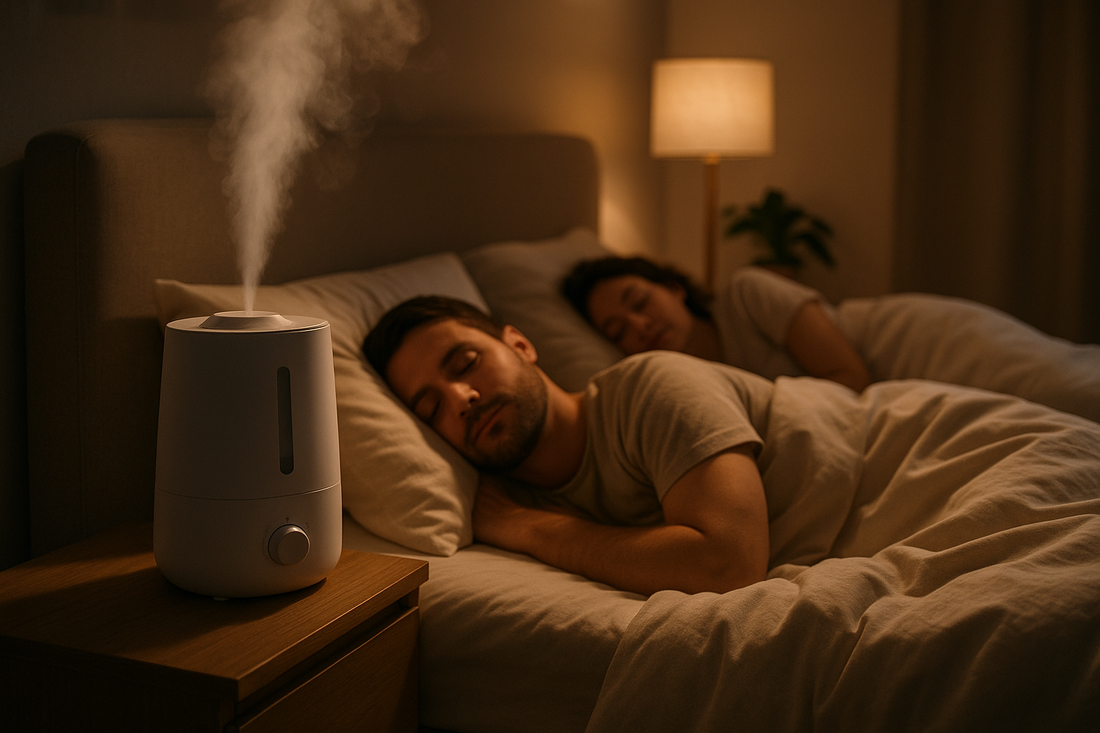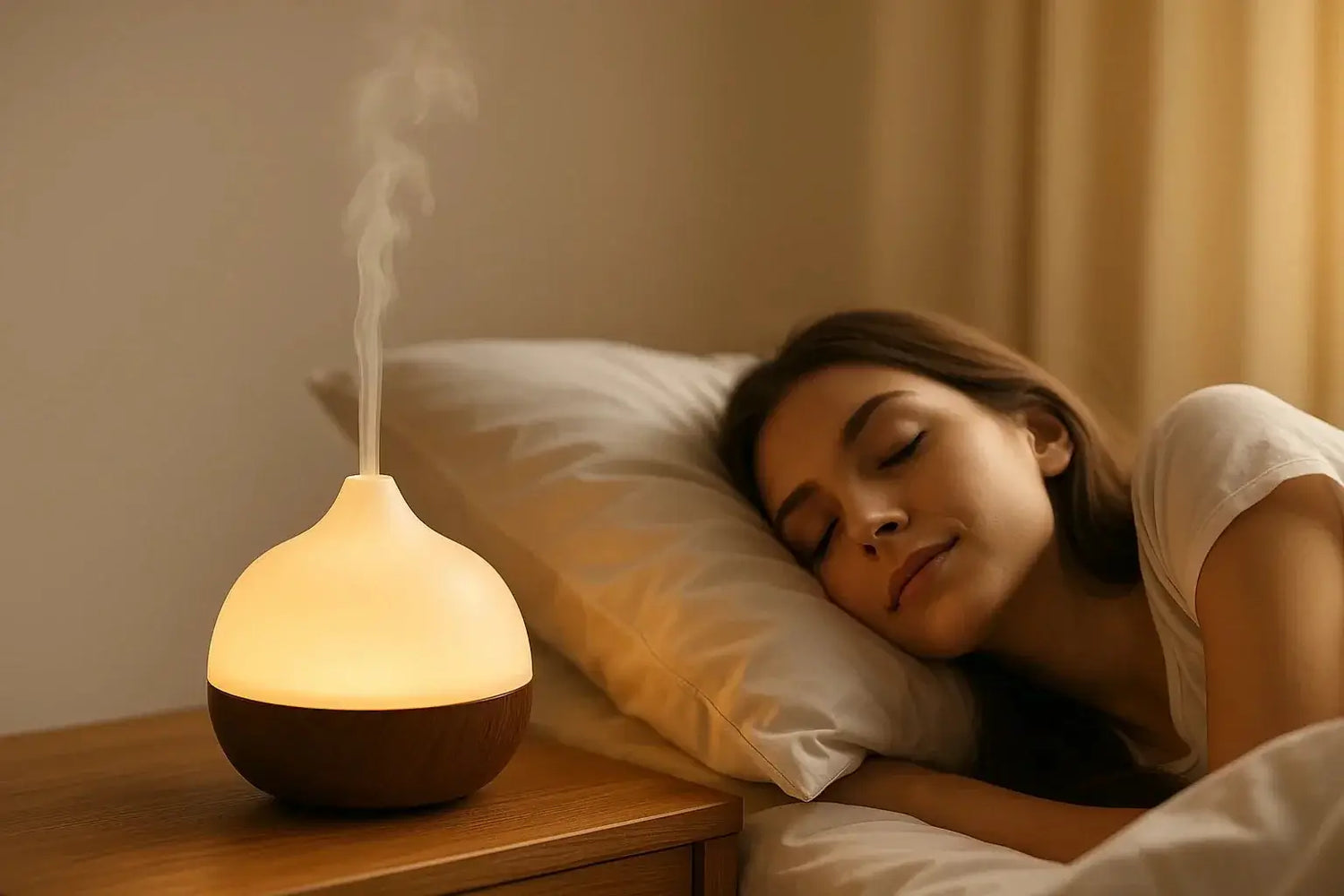
How a Humidifier Can Help Reduce Snoring: Benefits and Best Practices
Share
If you or your partner is among the 45% of adults who snore occasionally, you know how disruptive it can be for a good night's sleep! Snoring can affect not just the snorer but also their bedmate, leading to sleepless nights and grumpy mornings. If you’ve ever been nudged awake or found yourself unable to drift off because of the sounds of snoring, the good news is that there’s a simple solution that might help: a humidifier for snoring! Yes, you read that right! Adding moisture to your air with a humidifier can actually help reduce snoring. So, let's dive into the benefits and best practices of using a humidifier to improve your sleep quality.
Understanding Snoring: Causes and Effects
Before we delve into how a humidifier can help, it's essential to understand the factors that contribute to snoring. Snoring occurs when airflow through the mouth and nose is partially obstructed. Various factors can lead to this obstruction, such as:
- Nasal Congestion: Allergies, colds, or sinus infections can swell nasal passages, making it difficult to breathe smoothly.
- Sleep Position: Sleeping on your back can cause your tongue to fall backward, blocking airflow.
- Obesity: Extra weight, particularly around the neck, can put pressure on the airway.
- Alcohol and Sedatives: These can relax the throat muscles, increasing the likelihood of snoring.
- Anatomy: The structure of a person's throat, tongue, or palate can also contribute to snoring.
Interestingly, something as simple as humidity can impact many of these factors. Let’s explore how a humidifier can work wonders for those who snore.
How Humidifiers Help Reduce Snoring
Using a humidifier can significantly influence snoring for several reasons. Here’s how:
1. Moisture in the Air
The primary function of a humidifier is to add moisture to dry air. Dry air, often prevalent during winter or in arid climates, can irritate your nasal passages and throat, leading to inflammation and increased snoring. When the air is humidified, it keeps those passages moist and reduces irritation, which can help prevent snoring.
2. Preventing Congestion
Many people suffer from sinus issues or allergies, which can be aggravated by dry air. A humidifier works to counteract these problems by keeping your airways hydrated. Less congestion means easier breathing, resulting in less likelihood of snoring. Imagine a blissful night without constant interruptions!
3. Comfortable Sleep Environment
Many individuals sleep better in a slightly humid environment. Dry air can cause discomfort, leading to restlessness and disrupted sleep. A humidifier not only ensures moist air but also contributes to a cozy atmosphere within your bedroom. If you're looking for both humidity and a calming ambiance, consider the Sleep Diffuser from QuietAura. It combines essential oils with a gentle mist, promoting relaxation and sweet dreams!
4. Reducing Dust and Allergens
Humidifiers can also help reduce dust and allergens in your home. When the air is too dry, these particles can circulate and lead to respiratory issues and increased snoring. A humidifier helps trap some of these irritants, making your breathing easier and reducing congestion. It’s a practical tool for maintaining a healthier breathing environment!
Best Practices for Using a Humidifier for Snoring
Now that we understand the many benefits of using a humidifier, let’s talk about how to optimize your humidifier use to reduce snoring effectively.
1. Choose the Right Humidifier
Investing in a good-quality humidifier is crucial. The 3L Ultrasonic Humidifier from QuietAura, for instance, offers dual nozzles for even mist distribution and is perfect for bedroom use. When choosing a humidifier, consider factors like the size of the room, ease of cleaning, and any additional features like a built-in humidistat or essential oil tray.
2. Maintain the Right Humidity Level
It’s important not to over-hydrate your room. An ideal humidity level is between 30%-50%. Too much humidity can lead to mold growth and other problems. A hygrometer can be a handy tool to monitor the humidity levels in your space. It’s all about finding that sweet spot for maximum comfort!
3. Regular Maintenance is Key
Like any appliance, your humidifier needs regular maintenance. Daily water changes and weekly cleanings are essential. Bacteria can grow in stagnant water, which can then be released into the air, affecting your health. Make sure to follow the manufacturer's instructions for cleaning and maintenance!
4. Positioning Matters
The placement of your humidifier can significantly impact its effectiveness. Ideally, it should be placed at least a few feet away from your bed and on a level surface to allow for optimal mist distribution. Avoid placing it too close to walls or furniture to prevent any moisture damage. The goal is to create a comfortable microclimate specifically for sleeping.
5. Combine with Other Strategies
While a humidifier can be a game changer, consider combining it with other techniques to combat snoring. Sleep on your side, maintain a healthy weight, and consider using nasal strips to further open up your airways. Addressing multiple factors can lead to a more comprehensive solution for snoring.
Partner Benefits: Better Sleep for Both
One of the most significant benefits of using a humidifier for snoring is the positive impact on your partner's sleep quality. When snoring is minimized, both partners can enjoy a better night’s rest. This not only enhances individual health and mood but can also strengthen relationships by reducing nighttime irritability and daytime fatigue. It’s a win-win situation for couples!
Understanding the Statistics of Snoring
Snoring isn’t just an annoyance; it’s also a common issue that many people encounter. Did you know that approximately 45% of adults snore occasionally? Furthermore, 25% of adults are habitual snorers. This statistic highlights just how prevalent the issue is and why finding effective solutions, like a humidifier for snoring, is essential for many households.
FAQs About Humidifiers and Snoring
Q1: Can a humidifier completely eliminate my snoring?
A1: While a humidifier can help reduce snoring, it may not eliminate it entirely. It’s essential to address other factors contributing to snoring as well.
Q2: How long will it take to notice an improvement?
A2: Many users report improvements within a few nights of using a humidifier, but it can vary based on the individual and other contributing factors.
Q3: Do I need to use special water in my humidifier?
A3: Generally, distilled water is recommended for humidifiers to prevent mineral buildup and to maintain air quality. Always refer to your humidifier's user manual for the best practices.
Q4: Can I use essential oils in my humidifier?
A4: Some humidifiers are designed to accommodate essential oils, while others are not. Check the manufacturer's instructions before using oils. For aromatic benefits, consider the Sleep Diffuser that’s specifically tailored for essential oils!
Q5: How do I know if I need a humidifier in my space?
A5: If you experience dry skin, chapped lips, or frequent congestion during the winter months, it might be a sign that adding a humidifier to your home could significantly enhance your comfort and sleep quality!
Final Thoughts
A humidifier for snoring could be just what you need to reclaim peaceful nights of sleep. With its ability to add moisture to dry air, prevent nasal congestion, and create a comfortable sleep environment, using a humidifier is a smart strategy in the quest for quieter nights. Don't forget, QuietAura offers a variety of options to suit your needs, including the handy USB Mini Humidifier for travel! And with secure checkout options like PayPal, you can shop with confidence.
Join the journey toward better sleep and less snoring today! Sweet dreams await!

